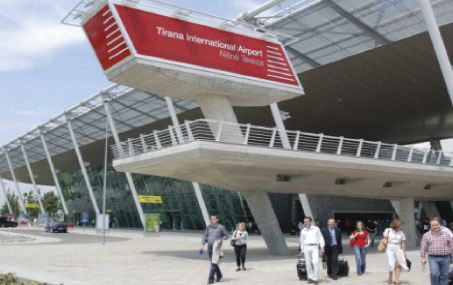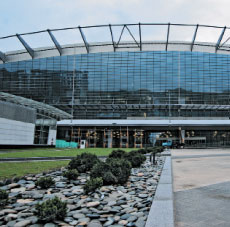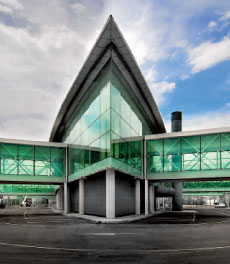
HOCHTIEF recently announced that it will sell off its AirPort division. Among the six airports in the portfolio is Budapest Airport, which recently inaugurated the new SkyCourt facility.
Interest in airport investment from private sources unsurprisingly took a hit as a result of the global economic crisis that struck in 2008. Three years on, in the face of sovereign debt crises, analysts now see airport privatisation as a necessary move for some governments, complemented by the return to growth in air traffic in much of Europe, potentially helping to attract additional interest from investors.
Thomas Frankl, CEO of Airport Development Partners (ADP) – a private airport consulting company dedicated to the development of regional airports across Europe – explained that he expects airport privatisation to become far more active in the near term.
“We had been in talks with the former Greek government about airport privatisation, only for those plans to be swept away by the socialist government. We expect to be able to resume the dialogue, and begin to talk to more governments as we expect airport privatisation finally to happen on a much larger scale across Europe,” he said.
Having highlighted “macroeconomic development, in particular a cooler economic climate in the major EU countries, and the solvency issues of EU peripheral countries” as the biggest causes for concern, Frankl added: “This said, we expect growth in emerging economies to continue to provide enough lift to keep the global economy afloat as developed economies finally get on a surer footing.”
Reiner Schränkler, Chairman of the Executive Board, HOCHTIEF Concessions AG, outlined his view that airports worldwide will continue to be viewed as a positive investment opportunity, especially given the sector’s much-displayed resolve. “The manner in which the sector has managed various crises in the last few years has shown that airports are a robust and attractive asset class,” he said. “For example, most recently, Athens Airport was able to keep pre-tax profit before extraordinary items at approximately the same level in the crisis year 2010 as in 2009. Our figures are solid proof. Moreover, investments in airports are urgently required in many places. As not nearly all state-owned airport operators will be able to finance the necessary expansion of capacity, further airport privatisations are likely.”

Schränkler: “The manner in which the sector has managed various crises in the last few years has shown that airports are a robust and attractive asset class.”
The downside for Europe lies in its weaker air traffic growth patterns compared to other world regions, as well as a penalising policy and regulatory framework.
Secondary sales will also be present, as the case study of German construction group HOCHTIEF demonstrates. The six airports in the HOCHTIEF Concessions portfolio showed a +4.2% year-on-year increase in passenger traffic between January and April, and as the airports continue to display collective strength, the company has disclosed that it will soon sell the HOCHTIEF AirPort division and the related airport projects. The sale will be conducted as a dual track process (simultaneous preparation of a trade sale and an initial public offering), allowing the company to increase both the competition and transaction security. While details on potential buyers remain private, the aim is for the transaction to be complete in the 2011 fiscal year. “The six airports of HOCHTIEF Concessions have performed very well in the first quarter of 2011,” Schränkler said. “Passenger traffic grew dynamically with the exception of Athens International Airport. The number of passengers going through Budapest, Düsseldorf, Hamburg, Sydney and Tirana airports totalled 17.7 million – a +3.9% increase compared with the prior-year quarter.”
This followed a +4.4% increase in overall year-on-year passenger traffic in 2010.
Moscow airports set for merger

Vnukovo Airport is currently undertaking a number of improvements to the airfield, while later this year, the second phase of the new Passenger Terminal A will be commissioned.
Russia’s aviation infrastructure is set for an overhaul following the announcement by the country’s government that Moscow’s Sheremetyevo and Vnukovo airports will be merged under single management and privatised.
Sheremetyevo International Airport is currently state-owned, while the Russian government owns 75% of Vnukovo International Airport.
As outlined by Russian Prime Minister Vladimir Putin upon the announcement of the plans, the two airports will be developed before the joint operator is privatised.
As the two airports are located more than 50km apart, the merger will not involve the creation of a single complex, but instead will allow for collaboration in terms of management and route development.
Both of the airports are currently undertaking large-scale development projects, which are expected to continue as originally planned. At Vnukovo Airport, runway intersection repair works and the construction of high-speed taxiways will be completed this summer, while the main runway will be rebuilt and lengthened, starting next year. Before the end of 2011, the second phase of the new Passenger Terminal A will also be commissioned.
In keeping with its master plan to 2030, Sheremetyevo Airport, meanwhile, will open the new Terminal A for business aviation before the end of 2011, adding to Terminals D and E, which were introduced in November 2009 and May 2010 respectively. Construction of a third runway will also commence in 2012.
Aena Privatisation

The management of Barcelona El Prat and Madrid Barajas airports will be privatised through a concession to a private partner as part of Aena’s partial privatisation.
The new Aena Aeropuertos S.A. division will become functional in June as the privatisation of the Spanish airport operator gathers pace. The main difference in the structure of the company will be that the airports will be managed by a company rather than a government institution, and in the medium term up to 49% of this company will be in the hands of private stakeholders.
According to Aena – which manages 47 airports in Spain and has interests in 27 more around the world – this new structure will ensure that the company will have more flexibility in managing the airports, for example, in relation to commercial income.
In June, Aena Aeropuertos will begin a process of market sounding to look for institutional investors and a stock market listing will be considered when the market is deemed suitable.
A significant aspect of the privatisation process will also see the management of Madrid Barajas and Barcelona El Prat airports privatised through a concession to a private partner. The concessional companies will be created in July and the majority of its capital will be sold to private partners before the end of the year through a competitive public bid.







